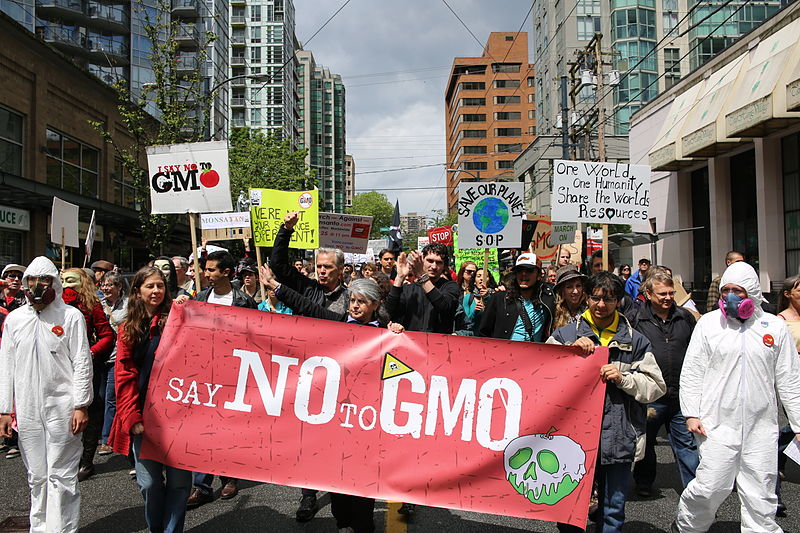Let’s make genetically modified food open-source
July 10, 2013

March against Monsanto (credit: Rosalee Yagihara/Wikimedia Commons)
If Monsanto is the Microsoft of food supply, perhaps the time has come for the agricultural equivalent of Linux, the open-source operating system that made computer programming a communal effort, Slate suggests.
“GMO agriculture relies on the relatively new science of bioinformatics (a mixture of bio- and information science), which means that DNA sequences look a lot more like software code than a vegetable garden,” says Slate.
“Genetically modified crops as we know them have as a general rule increased agriculture’s reliance on a system of expensive “inputs” — agro-speak for the proprietary seeds and herbicides that have brought untold profits to multinationals such as Monsanto and Dow.
“The reputation of transgenic crops has tanked, as what was once a harbinger of green technology is now commonly perceived as a source of genetic pollution and has thus become anathema for many environmentalists.
“Open-source GMO is a new idea for food justice activists, who have been concentrating their efforts on depleting Monsanto’s market share through consumer advocacy and political reform.
“Labeling laws for genetically modified organisms in the retail foodstream are about to land in statehouses across the country. But genetic modification does not equal Monsanto and Pioneer. The time has come to separate the dancer from the dance and admit that it is possible to be against big-agriculture and for scientific advancement.”
UPDATE July 10, 2013:
“It’s easy to knock big agriculture, but they’re a product of the business and market landscape,” says KurzweilAI Biotechnology Editor and noted synthetic biology expert Andrew Hessel. “Open source food crop biotech is possible and would almost certainly be a good thing. It’s unlikely to disrupt the big Ag companies in the short term, but it could see scientific communities organize and develop products that with sufficient R&D could enter the market.
“This said, open source food genetics will have to abide by the same regulatory barriers as the larger players, and farmers would have to choose to use them. Acceptance and successful competition is not assured simply because the modifications are transparent.
“Open source GMO won’t eliminate the GMO perception issue, either. Open or not, it’s a modified organism. At the end of the day, open food GMOs only change the competitive landscape in the free market. Perhaps preparing a future where genetic engineering is easier to do, Syngenta is already changing some of its IP practices to make it easier for small innovators to license and experiment with their patented traits. See http://www.ip-watch.org/2013/01/18/syngenta-opens-doors-to-its-patented-technologies-for-easier-but-not-free-access .”